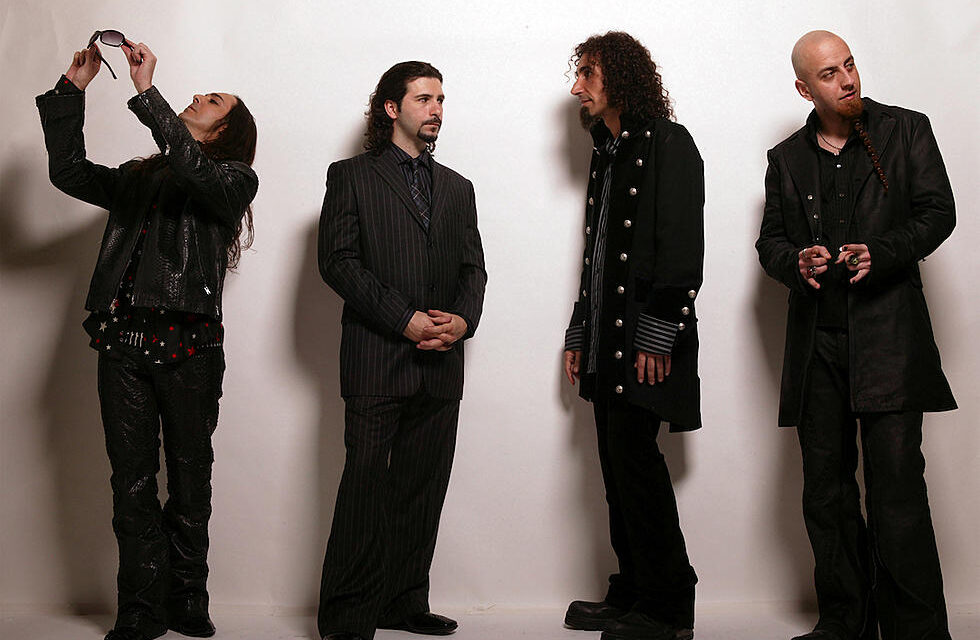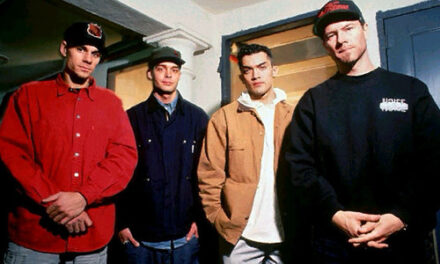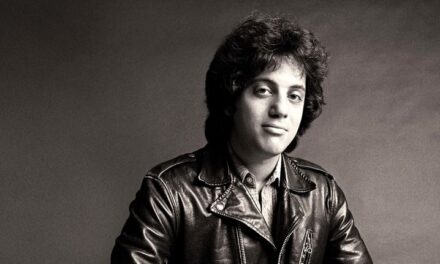

When System of a Down came through North Texas in 2005, they were one of the most popular prog-rock/metal bands in the country, inspiring dozens of other noisy bands that rose in their wake. Because I landed an interview with lead singer Serj Tankian, we decided to make System our cover story for the Star-Telegram’s weekly entertainment guide that week. And as the ultimate homage to the group’s prog-rock sound, I thought it’d be cool to do a Roger Dean-inspired cover – he’s the artist who designed all of Yes’ album covers, or most of them, at least. Star-T designer Dave Seymour worked his magic and designed a killer cover. Serj was a great interview, too.
Originally published Aug. 5, 2005.
Text:
Prog-rock has a new face – and its bassist has a braided beard.
System of a Down are, perhaps reluctantly, obliviously, leaders of a new wave of old-sounding bands, groups whose music is usually described as prog-rock, which is short for progressive rock, which is short for long, complicated songs that sound like someone falling down the stairs.
The prog-rock pioneers include Spock’s Beard; Porcupine Tree; Emerson, Lake and Palmer; Peter Gabriel-era Genesis; King Crimson; and, of course, Yes, whose album artwork, done by visual artist Roger Dean, inspired our cover; it played such apivotal role in defining what Yes, and prog-rock as a whole, represented: bombast and mystique.
The current crop of prog-rock groups includes System, Mars Volta (who are opening for System on Thursday at American Airlines Center), Tool, Sparta and others.
Now, anytime a band gets lumped into a specific genre or is named as the spearhead of a new one, they will, of course, either deny it or downplay it. Ask System’s lead singer Serj Tankian, about it however, and he’s quite proud that his group’s left-of-center music has cracked the mainstream – because, in his eyes, System did it their way.
“We did not start our careers on the radio,” he says. “We are not, and never have been, a ‘radio band,’ a band manufactured for the sole purpose to be played on the radio and make money. Even before we had a record out, before labels even recognized us, we had built a fan base. Part of it was that we play a certain type ofmusic that not a lot of other bands were playing.”
When the group signed to a major label – a sign that someone believes in a band – and released their 1998 self-titled debut, longtime fans embraced it while radio pushed it away.
“It wasn’t ‘push marketing,’ it was ‘pull marketing,’ ” Tankian says. “Fans had to call the stations and say, ‘Why aren’t you playing [the album’s first single] Sugar? At the time, radio stations just wouldn’t touch us.”
That’s certainly not the case now. Touring behind Mezmerize, their third full-length disc and the first part of an ambitious two-disc set (its counterpart, Hypnotize, is due later this year), System are currently on a headlining tour of arenas, and their music regularly tops the alternative-rock charts. Thanks to word of mouth and the mass media’s eventual discovery of the quartet, which is rounded out by guitarist Daron Malakian, bassist Shavo Odadjian and drummer John Dolmayan, their fan base has swelled to millions.
The good thing about having so many fans is that System can get their messages, philosophies and beliefs (most of which have either subtle or blunt political slants to them and sometimes have roots in their Armenian musical heritage) across to amass of people. But the question is: Are their fans really listening?
Rage Against the Machine, another politically minded band, faced the same situation: Their music was overwhelmingly powerful, so much so that it often drowned out the band’s political stances.
“That’s a good question, but we’re not here to preach to our audience,” Tankian says. “We’re here to entertain them.”
In the studio it’s something of a different story. Their songs cover all kinds ofpolitical and government-questioning bases, and Tankian speaks softly and intelligently about them. System of a Down’s Toxicity CD was No. 1 on the pop music charts on Sept. 11, 2001.
“We took a lot of heat for statements we made on that record, especially after Sept. 11,” he says. “No one wanted to hear about foreign policy or the oil trade.
“But what’s interesting is that during the election, a lot of artists spoke out. I stepped back and said, ‘Here they call us a ‘political band.’ Now, everyone is. At that point, they felt compelled to speak. We always feel compelled to speak.”











